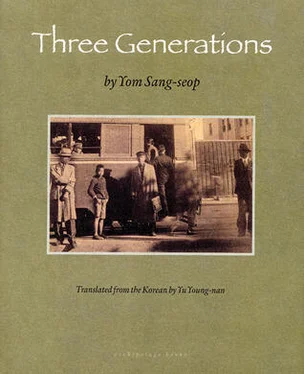When Jang Hun was thrown into jail, the policeman on duty had cleaned out his pockets but missed the cocaine. Jang Hun himself had forgotten all about it. After suffering through three days and nights, he wanted to die. He remembered his promise to Byeong-hwa, and he suddenly thought of the cocaine, as if someone had whispered the word in his ear. He couldn’t remember what had become of it but checked in his vest and felt something at the bottom of it. He was as happy as a jail breaker who had discovered an iron pick.
Jang Hun tore the worn-out lining and a small paper bag fell into his hand. Yet now that the cocaine was in his possession, his courage faltered. Despair and fear made him dizzy.
Should I die now? But what then? He scolded himself for being so cowardly. If I die now, it’s not because I can’t endure the pain. Nor does it make sense that I’ll be dying on behalf of dozens of my comrades. I just don’t have the sacrificial spirit to rescue them and their families from pain and misfortune. With my death I’ll protect a small incubator that will determine the fate of our cause. Several gifted comrades with superior scientific intelligence are gathering together to perform important research — research that may provide breakthroughs in the near future. For now, it’s my responsibility to protect these scientists at all costs, even though by doing so I will never see the fruits of their efforts. My death is worthwhile — for this, if nothing else.
As he drank some water after dinner, Jang Hun tossed the cocaine into his mouth as if he were taking an aspirin. He did it mechanically, in a daze. Now well past his fear of death, he paid close attention to how the drug moved through his system. When he cut his tongue, he was barely aware of what had happened; the poison had advanced too far.
And so, one daybreak, Jang Hun’s life ended at the age of twenty-seven.

“Father, where is Grandfather’s will? We’ve got to have it if we’re ever going to get out of here. You’re letting me go now, but Pil-sun, Yi Pil-sun, did you release her? Let me see her. Don’t beat her. I know that she’s innocent. Pistol? I don’t know. I’m sorry. Thank you. Can I go home when I get better?”
In his delirium, Deok-gi rattled on, opening his eyes wide and shutting them again.
Deok-gi hadn’t completely recovered from the flu when he was taken into custody, but he decided to conceal his condition. Actually, he was so weighed down with worries that he had little time to think about his fever.
After having been escorted to his house, he spent two more nights in a cell that was as cold as it was outside. His temperature rose, and it was difficult for him to sit up straight. The next morning, as he was being taken out, he collapsed at the threshold of his cell. They dragged him into an interrogation room, but fortunately, it was the High Police chief who had summoned him. Seeing how Deok-gi’s eyes flickered and how he stammered, the chief hurriedly called the doctor, exchanged opinions with his staff, and had Deok-gi confined to the medical-school hospital with the understanding that he would take responsibility for this measure. They wouldn’t allow Deok-gi to go home, and a brawny policeman stood guard at his bed at all hours. His mother and wife took turns taking care of him, but no one else was allowed access. Pil-sun’s father was in the same hospital, and Pil-sun’s mother had come as soon as she heard the news, but she was not permitted to see Deok-gi. For the first time, Deok-gi’s mother and wife were grateful for the detective’s actions.
“What a relief that all my assets are gone. Don’t worry, Mother. I’m not going to let them kick you all into the street.” He talked in his sleep and opened his eyes as if he were fully conscious. His mother’s eyes were wet with tears.
Deok-gi’s wife nursed him for three days without budging from her place near his bed. She didn’t bother about her appearance and didn’t even wash her face properly. Though her mother-in-law had urged her to take a nap, she didn’t lie down once. She would doze off in her chair, using her arm as a pillow. Now that the baby was weaned, she had left him at home to be fed thin gruel. Not allowing herself to think about the child, she devoted all her energy to caring for her husband. That day her mother-in-law went home to rest, and her own mother would come to keep her company that night.
She felt a sharp pain when Deok-gi mentioned Pil-sun in his delirium. What deep feelings did he have for her that he would call out her name even in his confused state? How could he utter Pil-sun’s name with such yearning if it were not etched in his heart? Was he repeating his pleas to the detectives? At times she couldn’t bear the sight of him. The family’s wealth was gone now, and her husband might soon have a concubine. If she had to endure poverty or tolerate a concubine or both, she would bear it all with a smile on her face, but what if he divorced her? But these were all just conjectures. She tried to calm herself. It was senseless to think such thoughts when her husband was hovering between life and death.
No. My husband wouldn’t do it. Isn’t he the eldest son of a yangban family? The thought comforted her.
A few days later, Deok-gi’s temperature chart, drawn on a graph hanging at the foot of the bed, began to show a gradual drop, and the sharp ups and downs of his fever leveled out. He could now sit up and swallow some milk.
His family was thankful for his recovery, but they didn’t want him to get better too quickly. They were afraid that the detective, who was standing watch at the head of the bed like a messenger of death, would snatch him away as soon as he improved.
Deok-gi’s mother pleaded with the detectives. “We’re relieved, but please put in a good word for us so they won’t touch him until he makes a complete recovery.” It might have helped if she had pressed a ten-won bill into their hands to pay for cigarettes. But she feared and despised them, not to mention she didn’t know the ways of the world. The next afternoon Deok-gi was yanked from his bed and escorted back to the police station, although he couldn’t stand on his own.
Amid the chaos, Deok-gi asked to see Pil-sun’s father, but the detectives wouldn’t hear of it. A nurse was sent to bring out Pil-sun’s mother, and Deok-gi saw her in the lobby. She wept when saw him. Witnesses to the emotional scene, Deok-gi’s wife and mother were perturbed.
At the station, the Judiciary Section chief greeted him with, “What was written about the rice refinery in your grandfather’s will?” Deok-gi wondered whether his father had been caught. Or could it be that his father’s whereabouts were still unknown, but someone else had raised the subject? He didn’t know what answer would be helpful to his father, but he told the truth — that there had been no mention of the refinery.
“Then did he leave any oral instructions before his death?”
“He didn’t have the time to do so.”
“Then who’s managing it?”
“I am.”
“Would you give it to your father if he demanded it?”
“I thought I’d give it to him when the time is right.”
“Did you know anything about a separate will, stating that he’d leave the refinery to your father?”
Deok-gi was astonished. It dawned on him that his father may have made such a fuss in order to take the rice refinery, by stealing his grandfather’s seal and forging a will.
Deok-gi shrugged.
“Did you arrest the imposters? Did you find the keys?” Deok-gi asked.
The chief smirked. “What imposters? Do you mean your father? We’ve recovered half of your assets, money that would have been gambled away. You young people shouldn’t resent the police. You ought to thank us.”
Читать дальше













